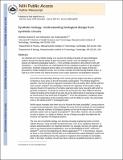Synthetic biology: Understanding biological design from synthetic circuits
Author(s)
Mukherji, Shankar; van Oudenaarden, Alexander
Downloadvan Oudenaarden_Synthetic biology.pdf (1.201Mb)
OPEN_ACCESS_POLICY
Open Access Policy
Creative Commons Attribution-Noncommercial-Share Alike
Terms of use
Metadata
Show full item recordAbstract
An important aim of synthetic biology is to uncover the design principles of natural biological systems through the rational design of gene and protein circuits. Here, we highlight how the process of engineering biological systems — from synthetic promoters to the control of cell–cell interactions — has contributed to our understanding of how endogenous systems are put together and function. Synthetic biological devices allow us to grasp intuitively the ranges of behaviour generated by simple biological circuits, such as linear cascades and interlocking feedback loops, as well as to exert control over natural processes, such as gene expression and population dynamics.
Date issued
2009-11Department
Harvard University--MIT Division of Health Sciences and Technology; Massachusetts Institute of Technology. Department of Biology; Massachusetts Institute of Technology. Department of PhysicsJournal
Nature Reviews Genetics
Publisher
Nature Publishing Group
Citation
Mukherji, Shankar, and Alexander van Oudenaarden. “Synthetic Biology: Understanding Biological Design from Synthetic Circuits.” Nature Reviews Genetics (2009)
Version: Author's final manuscript
ISSN
1471-0056
1471-0064